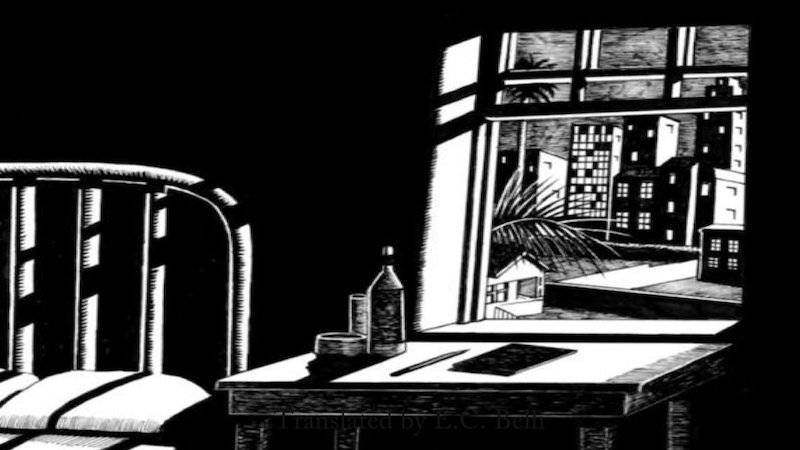A Prisoner’s View of the Trump Administration
Sabine Heinlein on Her Correspondence with Dean Faiello
Dean Faiello and I have been pen pals since 2013 when he wrote to me from Attica prison after reading my book Among Murderers. Back then I only knew Dean, a former drug addict who is said to have been “a good-looking habitué of the city’s gay clubs,” from the little I read about him online: Dean practiced laser treatment without a license and, in 2003, failed to call 911 when one of his clients went into seizures and died. He buried the victim and fled to Mexico but was soon apprehended. In 2006, he was convicted of first-degree assault and unauthorized practice of a profession. His crime remained tabloid fodder for several years, until the press finally forgot and buried him.
Dean will be eligible for parole in 2022 after serving 17 years in prison.
I’m having a hard time reconciling the terrible events that put Dean behind bars with the Dean I came to know through his letters and essays: an avid reader, a keen observer, an empathetic human being and a remarkable writer. Whenever I receive a letter from Dean, I am amazed by his unusual inverted worldview, his inside commentary on our strange outside world. Maybe there are two Deans, and I have only gotten to know the good one. Or maybe he is an example of people’s ability to grow and change. I like to think it’s the latter and that reading and writing has had a lot to do with his transformation. As writers, we write ourselves into being better.
Particularly since the election, I have been thinking a lot about this twisted world of ours where I feel closer and more empathetic towards “a murderer” than towards the callous, habitual liar whom our country made its president, the man who said brazenly, “I could stand in the middle of Fifth Avenue and shoot somebody, and I wouldn’t lose any voters, OK? It’s, like, incredible.” (What’s incredible is that he was probably right.)
My closeness to Dean cannot be measured in distance; it has to do with our honesty, our mutual interests and the authenticity with which we write to each other. Recently, our conversation often returned to Donald Trump. I was curious what the elections “felt” like from the inside a world that renders its people invisible, yet for some beautiful (and equally horrifying) reason allows them to feel and think.
While Trump continues to lie, Dean continues to write, courageously, about being gay in prison, his addiction and the whole “dysfunction mess” that landed him behind bars. Dean’s example gives me strength and hope in the four years to come. If we continue to think and write and speak up, undeterred, someone will listen and we will survive.
A couple of years ago, Dean “lost” my address, and our correspondence stalled for some time. After the infamous escape from Clinton prison in upstate New York, which was facilitated by correctional staff, officers at Attica raided the cells, allegedly looking for contraband, throwing away many of the inmates’ belongings. My address was among the things that went missing in Dean’s cell. While correctional staff suffered few repercussions as a result of the escape, prisoners like Dean, who had nothing to do with the escape, bore the brunt of the burden.
Even though Dean spent many years on the “honor block,” the little slices of freedom he has enjoyed have been curbed as a result of the Clinton escape. As if in solitary confinement, he now finds himself locked up in his cell for 19 hours a day. Over Christmas and New Year’s he spent several days in his cell without getting out at all. The Alternative to Violence program, which was first established by the Quakers, is one of the few groups that allows prisoners to meet people who like to read and question the world. It is a place that Dean returns to in his letters.
If it weren’t for him, I would have only seen Attica from three narrow angles: its thick walls and feudal guard towers viewed from the parking lot, the visiting room and one of its classrooms. While reporting my book, I once joined the Attica Quaker meeting. My spotty memory keeps returning to two things: a loudly ticking clock, denoting the spite of time, and a puddle. The leaking classroom ceiling had created a miniature alpine lake in front of a mural depicting a deer and a snow-capped mountain.
I always send Dean my stories because I like how closely he reads them and how his thoughts come from a place that is far away, yet close to my heart. American prisoners don’t have access to the Internet, and many of their libraries are understocked and out of date. Yet I have found that prisoners know more about the politics behind the criminal justice system than we do—and certainly more than Donald Trump. Sometimes, my stories serve as a springboard that lead Dean to tell me about the harsh conditions he faces at Attica, about what he has read and written; other times it’s yet another idiosyncratic rule that appears out of nowhere, its sole purpose being humiliation.
Dean Faiello’s story is an example of the triumph of the human spirit that, at least in some instances, prevails despite hardship and obstacles. This is not only to say that Dean is the polar opposite of Donald Trump, who, despite his privileges and the leniency of his supporters, refuses to acknowledge his mistakes, work on himself and take responsibility.
Dean gave me permission to condense and slightly edit his last two letters to me.
Dear Sabine,
How are you? Thank you so much for your letter and your articles.
It’s 4am, and I can’t sleep because it is near 90 degrees in here. Some bonehead in the administration sent a memo to all correctional officers and staff declaring that, while the heat is on (October 15 to May 15), all the windows in the prison must remain shut. Needless to say, indoor temperatures have soared. It’s ludicrous. I woke up at 3am in a pool of sweat.
Fortunately, I have your articles to read. Thank you! I just finished “Truther Love” [about a dating site for conspiracy theorists] and I feel so much better about myself. It’s like watching a fifty-car pileup during a snowstorm on the thruway. The term “awake” reminds me of the Black Lives Matter movement, which uses the term “woke” as a rallying cry for social justice. It’s from Erykah Badu’s “Master Teacher” song: “I stay woke.” I’ve been doing Alternative to Violence sessions where we describe our efforts to stay “woke.” We mainly talk about social justice issues, like mass incarceration, racism and gender inequality. One man in the group spoke about Jesse Williams’s speech at the 2016 BET Awards, how those of us in prison have been discarded like “rinds of a strange fruit.”
Since coming to prison I’ve learned that there are many more people like your story’s main character DancingDark. Disempowered and disenfranchised, prisoners cling to conspiracy theories. We grasp at anything that brings logic to a senseless environment. There are men who believe that George W. Bush orchestrated 9/11 (he’s an asshole but not that crazy); that antidepressants cause insanity and sterility; and that the missing Malaysian airline flight MH370 was taken up by the mother ship to another galaxy. These are the theories that I am subjected to as I sit in the mess hall and stare at the stainless steel table in front of me. I can’t help but be mad—about the shouting and noise in the mess hall, the awful smelling food and at myself for the stupidity and selfishness that brought me here. I now rarely ever go to the mess hall. I would rather stick needles in my eyes than eat Attica’s bran flakes that have the sponginess and taste of bicycle tires.
But as loony as DancingDark is, I must say that I respect and, in some ways, admire her. She survives, runs a business and pays her rent. That’s more than I can say about my life right now. I can’t even open the window outside my cell!
For 19 hours a day I now sit in my cell, reading, writing, typing and eating. I sit at a desk, a steel shelf really, that juts out of the wall and write: letters to my family and essays that I struggle to get published. I solve crossword puzzles while eating my tuna sandwich (which is about all I can make in my cell). I used to have artwork on the walls of my cell, reprints from magazines. Matisse, Degas and Picasso. But the prison issued new rules prohibiting us from putting anything on the cell walls. Instead, I stare at the dirty beige paint, at graffiti from previous occupants. I often wonder what became of them, if they ever went home.
I’ve been in an ugly depression since Trump’s election. I used to go to the library frequently to read newspapers, magazines and search for a good book but I stopped going almost entirely because I can’t tolerate the photos and newspaper headlines of Trump’s election and the “transition.”
Last night, I made the mistake of going to the library. I read about Trump’s cabinet selections. We are about to regress to the Dark Ages. I returned from the library physically sick. I wish I could just crawl into a cave (with some good books) and not emerge for four years. Although I’ll probably be trapped with the cavemen that elected the Donald as Demagogue-in-Chief.
I’m now reading Andrew Solomon’s book, Noonday Demon, about the cultural and scientific connotations of depression, and about his personal battle with it. Solomon is a terrific writer. He describes how the stress of getting his first book published and the ensuing book tour and readings pushed him into a catatonic state. He couldn’t eat, sleep or shower. Having experienced the horror and the pain of depression, he writes with what the courts call “standing.”
Reading Solomon’s book I have realized I’m in the throes of an untreated depression, brought on by ten years at Attica and magnified by Donald Trump’s election.
I used to watch CNN every morning but haven’t turned it on since November 8. The endless parade of Trump talking heads who feel they need to interpret Trump’s remarks to tell us what they really meant, as if we’re illiterate or ignorant of the rampant racism that fuels his campaign. The prisoners in classrooms at the school building are well aware of the threats to religious freedom and democracy from a man who aspires to be a dictator, who admires a thug like Putin. Like everyone else, they worry about Trump’s picks for the Supreme Court, whether civil rights are in jeopardy, whether stop-and-frisk will be the policy in cities across America.
Prisoners in Vermont, Maine and Puerto Rico can vote. So why can’t we?
The good news is that I’m now “medium security prison eligible.” I requested a transfer to Cayuga prison. I’ve heard it’s small and laid-back and that they have an Alternative to Violence program there. Now it’s just a waiting game. I don’t know how long it will take for the transfer to be approved. I look forward to going to a medium prison, where there are more programs, more freedom, but I’m nervous about the transition and about the dorm-style living. This nervousness makes no sense. The restriction on movement at Attica stresses me out. And yet I don’t like change. I fear it. In prison, change is not chosen, it’s imposed. But going to a medium prison is part of the process of going home. So who is the insane person here? The ones waiting for the mother ship, or me?
I’ve had it with Attica. Every week there are new rules—each of which results in further restrictions. Now we have in-cell property limits. All your property has to fit in four bags—including clothes, food, books and paperwork. Anything over the four-bag limit must be destroyed. I spent years accumulating books—novels, dictionaries, collections of essays…
Families are prohibited from sending books to loved ones, and I had to buy books from prison catalogs. Since my prison pay for working as a teacher’s aide is only 25 cents an hour, books are a precious commodity, but I will have to leave them behind. As a result of the escape from Clinton Correctional Facility two years ago, so many privileges have been taken away: the honor block garden, ball, ping pong… Recreation has been cut in half. In fact, honor blocks have been eliminated throughout New York State. They now have what’s called “Earned Housing.” I called it “Earned Punishment.” In the last month, 15 men have been kicked out of the former honor block. Men who work for the prison administration as porters, clerks and teacher’s aides, who haven’t had a single infraction in years. In its arbitrary wisdom, the Department of Corrections and Community Supervision eliminated motivation for good behavior, for change.
By the way, did you read in the New York Times about the rampant racism within the NY state parole board? Supposedly Cuomo has requested an investigation. He’s committed to appointing more minorities as parole commissioners. Imagine that—racial diversity in the US government. Has Trump heard of that idea?
Congrats on your Guardian article about transgender artwork. I think Transparent has had a major role in enlightening people and making trans people more human, more acceptable. But the transgender men and women in prison still have it really tough. When a transgender prisoner walks into the mess hall, the crude remarks and laughter reverberate through the cavernous spaces. Did you read the article in the New York Times about a transgender prisoner in Georgia? The abuse she endured was horrific. And the Georgia Department of Corrections was complicit!
About conversion therapy: Remember the essay I wrote, “Reparative Therapy,” about the erroneous belief that gay men and women can be made hetero through therapy? Dr. Robert Spitzer developed it. He later repudiated it as a failure, however. Vice-President Mike Pence embraces it. Someone should impose conversation therapy on Pence and on Trump. For starters, it would be wonderful if they transformed into people who accepted science. Maybe they’ll come around to the fact that Mexicans are people, too, just like them. Only smarter.
I just finished revising and retyping my fourth version of “Contrapasso”—17 pages, 5,000 words. Contrapasso is a term from Dante Alighieri’s Inferno. It means “appropriate punishment,” or “punishment in return.” The Inferno and Attica are much alike. I’ve decided that this is my last version. Monday, I’ll be submitting copies to literary magazines for consideration. I’m submitting to Agni, The Sun, The New England Review and, what the hell, the Paris Review. Wish me luck.
I hope you and your menagerie are all well.
Happy New Year!
Dean




















